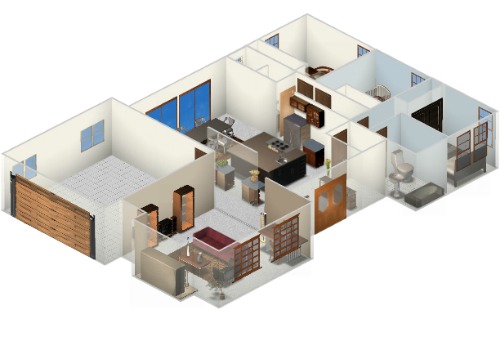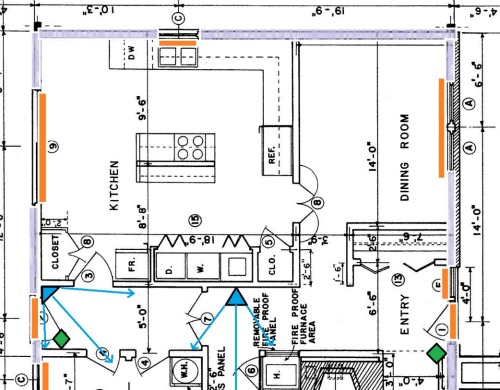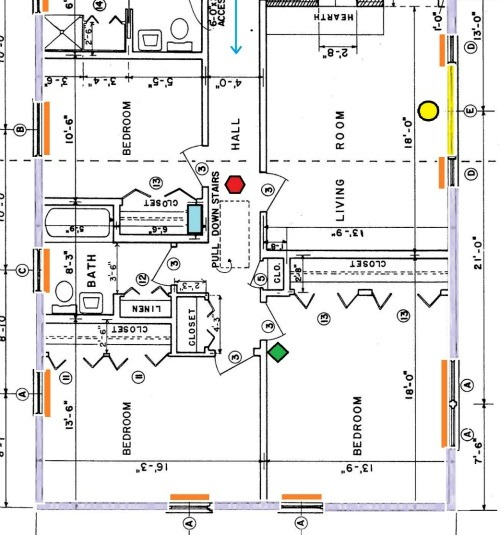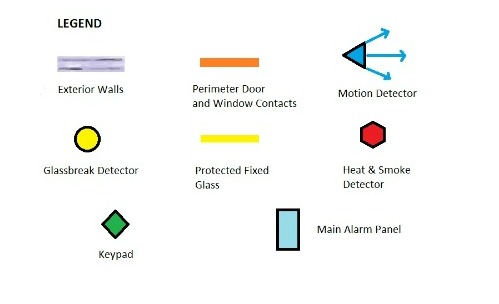- Home
- Compare Systems
- Cheap Systems
- Free Quotes
- DIY Systems
- Hardwired Systems
- Wireless Systems
- Smoke Detectors
- Medical Alarms
- Alarm Monitoring
- Cameras & Video
- Ademco
- ADT Security
- Brinks Security
- Broadview
- DSC Security
- FBI Alarms
- GE Security
- Honeywell
- Link Interactive
- Monitronics
- Moose
- Napco
- Protection 1
- Radionics
- Simplisafe
- Alarm Manuals
- Alarm System Parts
- Alarm Tools
- Troubleshooting
- FAQ
- Glossary
- Sitemap
- About Me
- Contact Me
Finding the Best
Home Alarm System
Perimeter and Interior Layout
Finding the best home alarm system is really a two-part process. First, you need equipment that has features and capabilities you want. Second, that equipment must be installed in the best locations to give you the coverage you’re looking for.
This article deals with perimeter and interior burglary protection, the primary methods of securing a house. I’ll explain what they are, why you need them both, and show you a few “exceptions to the rule”.

Using this information will help you choose the best home alarm system for your situation.
Keep in mind that these recommendations apply whether you’re looking for a wireless alarm or a hardwired system. Sensors of all kinds are available in wireless and hardwired versions, but their functions remain the same.
If you haven't done so already, get a few Free Home Security Systems Quotes from companies in your area.
This will give you a good idea of what it would cost to have a system installed, as well as how much you could save by doing it yourself.
The Best Home Alarm System Perimeter Protection
A perimeter security alarm is the first line of defense for any home.
Magnetic reed switches are, by far, the most commonly used
devices for this. All exterior doors and movable windows should be
“bugged”, with a few exceptions which I'll cover in a minute.
Some security companies may try to sell you a system that only
uses interior protection, such as motion or glassbreak detectors. While
this may save you a few dollars (and is even acceptable if that’s all
you really want), it’s not the best solution.
There are several reasons for covering the entire perimeter:
- Most burglars will open a door or window at some point during a
break-in. They may do this to gain entry, or to make it easier to carry
items out. Either way, an alarm will be generated as long as the
perimeter is protected.
- Alarming the perimeter helps you use the system the
smart way. Sensors report their status to the keypads, where you can
easily see if everything is closed before you arm the system. Without
them, you might arm the alarm with a door or window standing wide open.
Needless to say, not much of a system!
- Almost every alarm panel has a “Chime” feature. This causes the keypads to beep if a protected door or window is opened. You can use this function to let you know if something opens, when you’re at home with the system disarmed. For many people, this feature gives them as much peace of mind as the actual alarm function.



Having said all that, there are some exceptions to alarming all
perimeter openings. These will be based on the physical layout of your
house, your budget, and your personal preferences:
- Very small windows, like those found in many bathroom shower areas,
are not big enough for a person to fit through. They can safely be
skipped.
- Second-floor or otherwise inaccessible windows are
often not included in alarm coverage. Unless there is a deck or stairway
leading to them, these openings would be difficult to reach.
Ground-level openings are far more likely to become targets for a
break-in attempt.
- Openings with security bars already installed may be left out of the alarm plan, as long as the bars are in good condition and you plan on keeping them.
Burglars tend to take the path of least resistance, and they look for easy spots to get in. If you have any hard-to-reach openings, you may want to skip them and spend your money elsewhere in the system.
Interior Burglary Protection
The best home alarm systems will have some sort of interior
protection. Motion detectors are the preferred method, and give you a
good second line of defense. The interior devices will likely trip up
any intruder who manages to get past the perimeter.
Motion detectors are needed because perimeter protection won’t
detect the breaking or cutting of glass. Perimeter sensors only sense
the movement of the door or window frame.
Although glassbreak detectors are also commonly used, I always recommend installing at least one motion sensor.
Why?
Even if you could afford glassbreak detectors at every piece if glass in your home, they have two big limitations:
- Most glassbreak detectors can’t detect the cutting of glass. While cutting glass isn’t commonly done, it does happen.
- You only get one chance to detect the glass breaking.
If, for some reason, the detector doesn’t trigger when the window is
smashed, you don’t get a second chance.
Unlike glassbreaks, motion detectors can sense movement after the initial entry is made. You get lots of chances to catch the intruder as he goes from room to room, down hallways, etc.
Why wouldn’t a glassbreak trigger?
Heavy drapes, shutters, and many other furnishings reduce the range of glassbreak sensors.
Even though the system was likely tested when it was installed, you may have added items like this afterwards and inadvertently reduced your protection.
The best home alarm systems provide some sort of “Home” or “Stay” arming
options. This allows you to arm the perimeter separately from the
interior, so you can secure the house and still move around in it.
Motion detectors do have some limitations. If you have pets, you
may not be able to use motion detectors on a daily basis. If you can’t
restrict the animal to an area without sensors, you’re better off not
using them.
So-called “pet-immune” motion detectors are available, and can
work well when installed properly. Even so, very active pets (especially
some cats) can set off even a pet immune detector.
I still recommend installing at least one motion detector in
every system. You can arm the motion sensor when you’re away on
vacation, and your pet is either with you or "vacationing" at a kennel. Also,
some kind of interior protection is a plus if you ever decide to sell
your home.
Special Areas
The best home alarm system should also protect special areas of a
home. These are often interior areas that need to be armed all or most
of the time. This includes wall safes, jewelry cases, gun vaults, and
any other sensitive areas.
Modern alarm systems have ways to custom-program zone behavior to meet the needs of these special areas.
Usually this means programming the zone as a 24-hour type, but
with the ability to bypass it with a few keystrokes at the keypad. This
gives you a way to access the valuables when needed.
The Bottom Line
Take some time to walk through your house, and count the number of doors and windows that need protection. Also make a note of any you don't think should be part of the alarm system.
A door and window count is the first question an alarm company is likely to ask when quoting a price. It helps them determine the type of alarm panel needed to cover your home.
If you're a do-it-yourselfer, you'll need this information for the same reason.
Wondering how much a new alarm system would cost?
Get free home security systems quotes from companies in your area. This will give you a good idea of what it would cost to install a system, as well as how much you could save by doing it yourself.
To learn more about what goes into the cost of an alarm system, see this page on home security prices.
Return to Home-Security-Systems-Answers from Best Home Alarm System Layout
Return to Compare Home Security Systems from Best Home Alarm System Layout
Note: Feel free to print any of the articles on this site for personal, non-commercial use. Just look for this button:
If you found this website especially helpful, you might want to consider making a small donation. Since 2011, AzAlarmGuy has been providing free help and advice on home security systems to all of those in need.
Your gift, in any amount, will help me keep this website a free resource for anyone needing help with alarm system issues or questions.
Disclosure
I receive affiliate commissions from some of the companies and products I discuss. These commissions don't change the price that you pay.
Rest assured that this compensation does not influence my recommendations. I only endorse products and services that I truly believe to be an honest value for you, as a visitor to my site.
For more details, see my full disclaimer.





